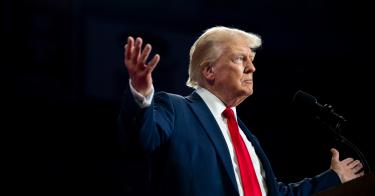University presidents can be chatterboxes on world events, no matter how removed from the immediate operation of their institution. But when it comes to the attempted assassination of a former president who is a leading contender for a new term, the cat seems to have gotten their tongue.
We searched the websites of more than 40 universities, including those in the Ivy League and the Big 10, for statements by their leaders condemning this instance of political violence. We found only one. The president of Michigan State University, Kevin M. Guskiewicz, was unequivocal in declaring: “Today’s violence at a presidential political rally is a threat to our democracy. Violence has no place in American politics.”
Michael Crow, president of Arizona State University, issued a statement to clarify that “the individual who attempted to assassinate former President Trump had no association with ASU.” But he had nothing to say about the attack beyond denouncing false rumors. Besides these two exceptions, university leaders were silent on the attempted assassination of Mr. Trump.
>>> Assassination Attempt: An Uncanny Repetition of Political History
Yet they have plenty to say about other political events. Georgetown University President John J. DeGioia rushed to issue a statement on Jan. 6, 2021, responding to that day’s events: “These acts are reprehensible and have no place in our country. I strongly condemn these criminal attempts to undermine our republic.” Apparently, trying to kill a former president and current candidate is not reprehensible or threatening enough to our republic to warrant comment.
Then-Ohio State University President Kristina M. Johnson emphasized her institution’s opposition to Russia’s invasion of Ukraine, declaring that “Ohio State has always been, and always will be, an institution that celebrates diversity and stands for dialogue and diplomacy over violence.” On violence against a former president of the United States, Ohio State has nothing to say.
Harvard’s former leader, Claudine Gay, elaborated on her feelings in reaction to the killing of George Floyd, saying, “For some in our community, and I count myself among them, the events in Minneapolis, Brunswick, Louisville and beyond, feel anything but abstract.” When Ms. Gay struggled to express similar empathy for Jewish students in the wake of Harvard protests in support of an attack that slaughtered Jewish Israelis, she attracted critical attention that revealed an alarming pattern of plagiarism in her scholarly writing.
To avoid future charges of employing a double standard regarding whether and how Harvard issues official statements, a university-appointed committee recommended that “the university and its leaders should not, however, issue official statements about public matters that do not directly affect the university’s core function.”
Perhaps the silence from Harvard and hundreds of other university leaders on the attempted assassination of Mr. Trump was the result of this newfound commitment to institutional restraint on public comment. Despite having previously issued statements on the Supreme Court’s ruling overturning Roe v. Wade, endorsement of LGBTQ pride and climate change, perhaps universities are determined to stay quiet on issues tangential to their regular operations—starting now.
>>> Harvard Takes a Small Step Forward
It would be laudable if universities adopted and stuck to positions of institutional neutrality, such as the Kalven principles. No one could be blamed, however, for doubting the sincerity and continued practice of university restraint in issuing public statements. Even Harvard’s new policy emphasized that the university is not value-neutral and would speak publicly on matters when it really wanted to, stating that “the report’s carefully worded language also provides administrators with enough flexibility to issue statements when they deem necessary to do so.”
If Harvard or other universities were serious about their intent to refrain from public comment, they would retract all prior statements violating their newly issued policies. If we are to believe that Harvard’s silence on political violence against Mr. Trump is a matter of principle rather than an instance of selective mutism, they should retract their prior statements on George Floyd, climate change and other matters not directly related to the university’s core function. The fact that they have not done so makes us suspect that Harvard, like others, will suddenly find their voice again when leftist causes are at stake.
Silence on political matters is perfectly appropriate for universities. Hypocrisy and double standards are not.
This piece originally appeared in The Washington Times



